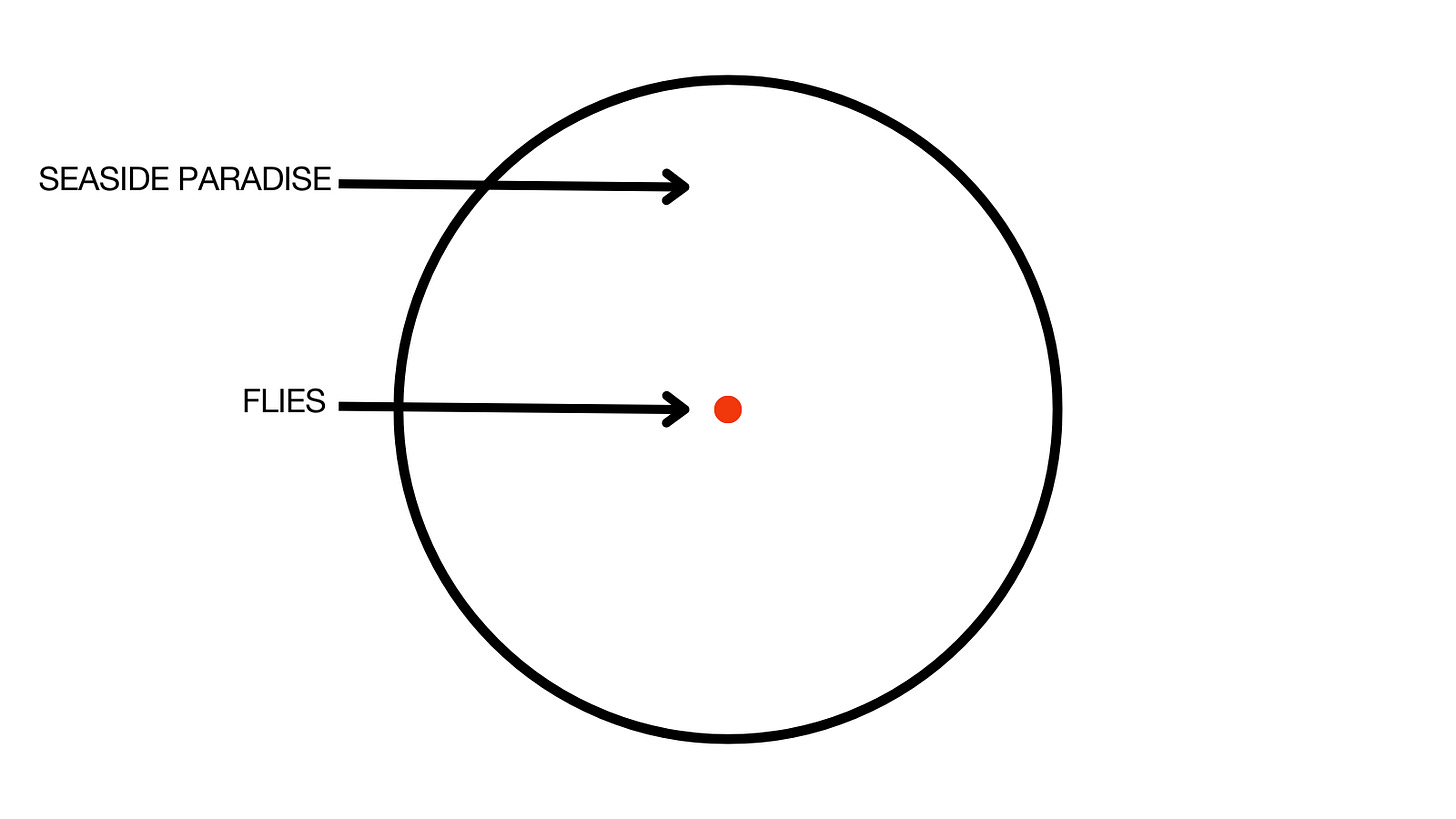Creating your own reality.
Flies in paradise.
Last week I found myself at a serenely beautiful seaside restaurant on the coast of Portugal.
Everything about the situation was about as picture-perfect as the relative world gets.
Everything except for the flies swarming us as we ate our lunch.
We couldn’t help but laugh at the reminder that even in paradise, sometimes there are flies.
Even in the most beautiful scenarios, we can find ugliness.
And even in the ugliest ones, we can find beauty.
But either reality exists only to the extent that we give it our attention.
We can make a conscious choice to keep our awareness on the vast and beautiful seaside, or allow it to be consumed by the miniscule airborne annoyances flitting around.
Through the power of our mind, we feed either reality simply by bringing our awareness to it—whether we realize it or not.
“Whatever we put our attention on will grow stronger in our life.”
—Maharishi Mahesh Yogi
The power of our attention is like a stream of water from a gardener’s hose.
As the gardener walks around surveying the beauty of his garden and watering the plants, he notices some weeds. As he turns to examine the weeds, he also causes the hose he is holding to spray in their direction, inadvertently nourishing them and making them grow even faster.
This isn’t just spiritual conjecture—in the realm of physics, subatomic particles like quarks, bosons and leptons come into existence only when observed. At all other times, they’re just probability amplitudes, or statistical likelihoods of finding that particle at a certain place at the time of observation. It is the quality of our attention that turns a given probability into a space-time event.
Our reality then, is a simple matter of where we choose to look.
As my teacher, Maharishi Vyasanand Sarasvati, explains in today’s new podcast on Quantum Mechanics, “you live in a universe that is a response to your expectation.”
So why put our attention on that which we don’t wish to grow?
With so much good in the world, why do we focus on that which we perceive as bad?
It’s not our fault—but it is our responsibility.
Stress we’ve accumulated over a lifetime—and haven’t yet dissolved—hijacks our way of thinking and colors the way we see the world.
Synapses that fire together, wire together, creating neural pathways in the brain which cause us to view new experiences through the lens of the stress of old ones, meaning we often default to perceiving them in a negative light.
The more stress responses we experience, the more deeply entrenched stress-thinking becomes, and the more it shapes our worldview.
As we unwind these deeply held stresses through Vedic Meditation and start seeing the world more clearly for what it is, we’re increasingly able to first catch ourselves falling into these thought patterns; only then can we create new ones instead.
Each time we catch ourselves, the old neural pathways erode a bit more, and the new ones deepen.
Famed author Wayne Dyer, himself a mentee of my teacher, had a special technique for retraining the mind, which Deepak Chopra shares in his book Creating Affluence:
Whenever he would catch himself thinking a negative thought, he would simply say to himself “next” and consciously move to the next thought.
But first, you have to clear the mind enough to be able to catch yourself.
It takes some time to dissolve a lifetime worth of stress, and then some applied discipline to continually retrain the mind to focus on the good instead of the perceived bad—on the seaside instead of the flies.
But the reward is an indefatigable ability to create your own reality at all times; to design your own experience.
“That is the vision of a knower of reality. Whatever good is there that is useful for us. The bad does not come to our mind.”
—Maharishi Mahesh Yogi
Let’s discuss these and other ideas during Collective Effervescence, our online group meditation series, this Sunday September 15 at 12PM ET. Drop in for meditation only (first 30 min) or stay for discussion + Q&A on this and other life topics from the Vedic perspective. Join the WhatsApp group to receive reminders 24 hours before each session, or use the below links to have all upcoming dates automatically sync to your calendar.
iCal / Google Calendar / Office 365 / Outlook / Outlook.com / Yahoo






